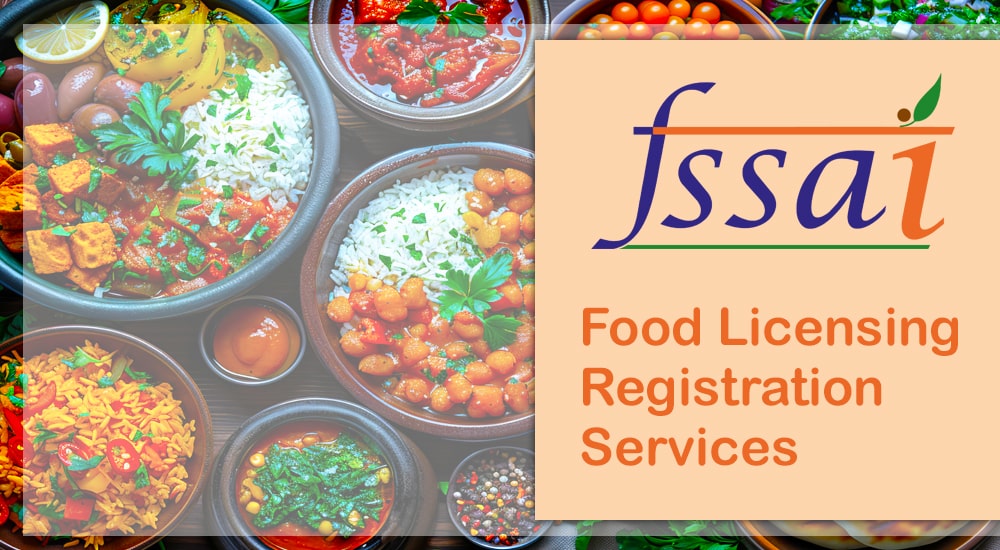
The Food Safety and Standards Authority of India (FSSAI) plays a critical role in ensuring food safety in India. FSSAI registration is mandatory for all food business operators (FBOs) to comply with food safety standards and regulations. This process provides food businesses with a unique 14-digit registration or license number, which must be displayed on food packaging. This number ensures that the food produced, distributed, or sold is safe for consumption and meets the standards set by the FSSAI.
Types of FSSAI Registration
FSSAI registration is divided into three main categories based on the size, turnover, and type of business operation. Understanding the right category is essential for food business operators to maintain legal compliance.
1) FSSAI Basic Registration (Type A License)
This is for small-scale food businesses, such as petty retailers, small manufacturers, and food processors. If a business has an annual turnover of less than ₹12 lakhs, it falls under this category. For example, small food stalls, homemade food businesses, and small local shops are eligible for basic registration. Although this license is for businesses with limited operations, it can be upgraded as the business grows and crosses the ₹12 lakhs turnover threshold.
2) FSSAI State License (Type B License)
Medium-sized businesses, including manufacturers, transporters, retailers, and distributors with an annual turnover between ₹12 lakhs and ₹20 crores, require an FSSAI State License. It is suitable for businesses operating at the state level. For instance, medium-sized manufacturing units, storage facilities, and food transportation companies fall into this category. The State License can also be upgraded to a Central License as the business expands across multiple states or exceeds ₹20 crores in turnover.
3) FSSAI Central License (Type C License)
Large food businesses operating across several states or with an annual turnover exceeding ₹20 crores need the FSSAI Central License. This license is mandatory for importers, exporters, large manufacturers, and national-level food businesses. It is also required for businesses involved in food supply for Indian Railways or those that cater to large-scale public services. The Central License ensures that these businesses meet all the necessary food safety standards for larger operations.
FSSAI Registration Process
To obtain FSSAI registration, food business operators must submit an application along with the required documents and fees. The type of license required depends on the scale of the business, annual turnover, and the nature of the operations. Once the application is approved, FBOs receive a registration certificate, which must be renewed periodically.
Who Needs FSSAI Registration?
FSSAI registration is required for a wide range of food-related businesses, from small-scale vendors to large corporations. The following are some of the key business categories that need FSSAI registration or a license:
1. Manufacturers: Any business involved in the manufacturing, processing, packaging, or labeling of food products needs FSSAI registration. This includes large factories and small home-based businesses.
2. Food Importers and Exporters: Companies involved in importing or exporting food products must ensure they have an FSSAI license to comply with national and international food safety standards.
3. Traders and Distributors: Individuals or businesses engaged in the wholesale or retail distribution of food products need FSSAI registration to ensure that the products they handle meet safety standards.
4. Hotels and Restaurants: Any business that serves food to customers, including restaurants, hotels, cafes, food stalls, and canteens, must obtain an FSSAI license.
5. Food Caterers: Businesses that provide catering services for events, weddings, or corporate functions are required to obtain FSSAI registration to ensure food safety.
6. Food Packaging Units: Businesses involved in manufacturing or processing food packaging materials also need an FSSAI license to ensure that packaging is safe for food products.
7. Food Storage and Transport: Companies that store or transport food products must register with FSSAI to ensure that food is handled safely during storage and transportation.
8. Online Food Businesses: E-commerce platforms, food delivery services, and food aggregators must ensure that their food vendors have valid FSSAI licenses. Benefits of FSSAI Registration
Obtaining FSSAI registration offers several advantages for food businesses:
1. Legal Compliance: FSSAI registration ensures that a food business is operating legally. This helps avoid fines, penalties, or potential shutdowns for non-compliance with food safety regulations.
2. Consumer Trust: Having an FSSAI registration number on food packages builds trust with consumers. It assures them that the food they are consuming meets safety and quality standards.
3. Market Access: FSSAI registration is a prerequisite for businesses to sell their products in supermarkets, retail chains, and online platforms. It opens doors to a larger market.
4. Enhanced Reputation: Businesses with FSSAI registration gain credibility in the market. Consumers and partners view them as reliable, ensuring higher customer loyalty and better business growth.
5. Quality Assurance: FSSAI registration enforces strict hygiene and safety standards, ensuring that the food produced or distributed is safe for consumption. This reduces the risk of foodborne illnesses and contamination.
6. Business Expansion: With FSSAI registration, businesses can expand into new markets, introduce new products, or enter into collaborations, both nationally and internationally.
7. Government Support: Registered businesses may receive guidance and support from government agencies to improve food safety practices and comply with regulations.
8. International Trade: For businesses involved in export or import, FSSAI registration is essential for complying with global food safety standards and gaining access to international markets.





